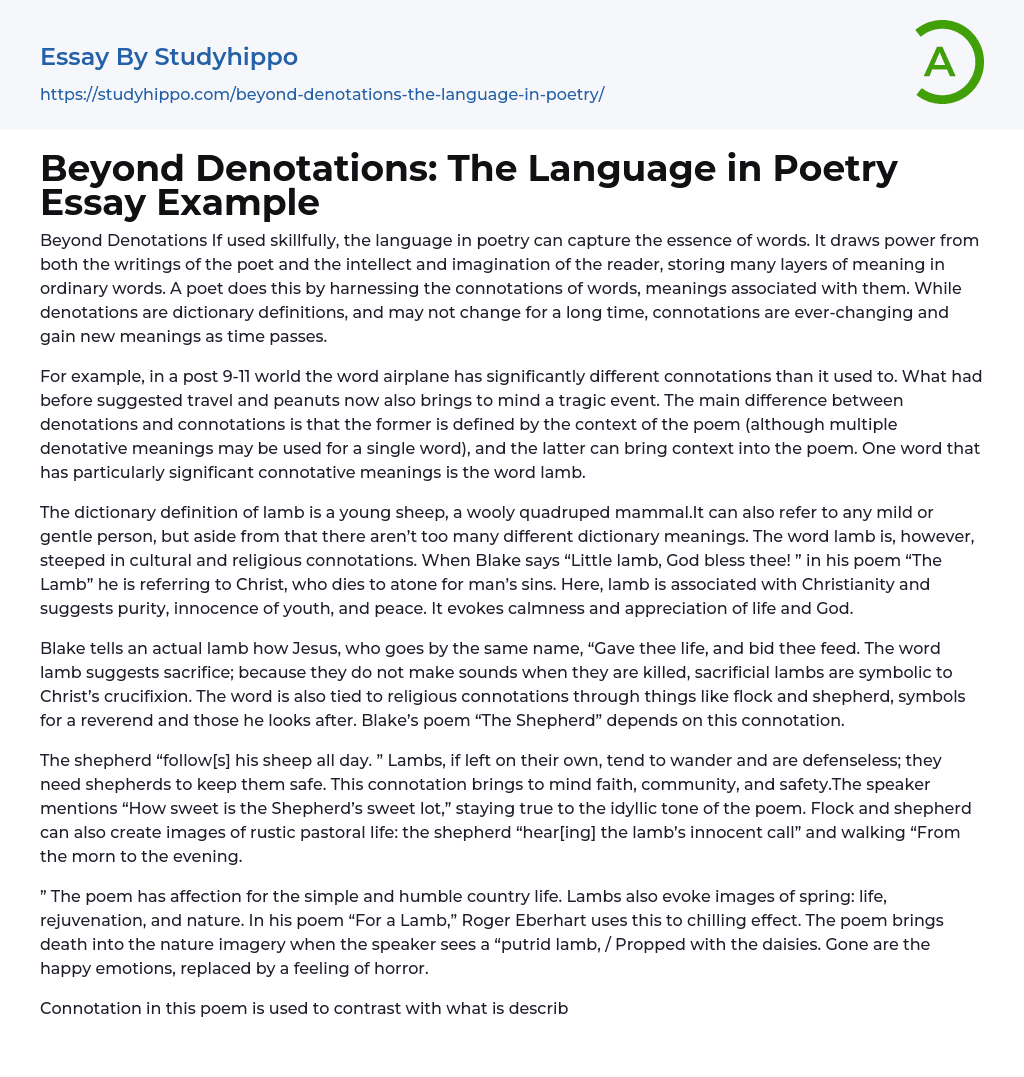Poetry has the unique ability to capture words' essence, surpassing their dictionary meanings. It derives power from the poet's writings and the reader's intellect and imagination, allowing ordinary words to carry multiple layers of meaning. This is achieved by employing the connotations of words, which evolve over time and acquire new significance, as opposed to denotations that are fixed definitions in dictionaries.
In a post 9-11 world, the connotations of the word airplane have drastically changed. While it used to imply travel and peanuts, it now also evokes thoughts of a tragic event. The distinction between denotations and connotations lies in how the former is shaped by the poem's context (even though a single word may possess multiple denotative meanings), while the latter can provide contextual meaning within the poem. The word lamb carries particularly
...significant connotations. Though its dictionary definition refers to a young sheep, a wooly quadruped mammal, it can also symbolize mildness or gentleness in a person. Beyond these, there are not many other dictionary meanings associated with the word.
The concept of the lamb carries deep cultural and religious implications. In his poem "The Lamb," Blake connects the word lamb with Christianity and the idea of purity, innocence, and peace. He addresses a literal lamb and tells it how Jesus, who is also referred to as the Lamb, gave it life and instructed it to feed. The term lamb signifies sacrifice, as lambs being silent when they are killed symbolize Christ's crucifixion.
The word is also associated with religious connotations, represented by symbols like flock and shepherd, which are used to represent a reverend and the people under his care. Blake's poem "Th
Shepherd" relies on this association. In the poem, the shepherd continuously watches over his sheep throughout the day. Lambs, when left unattended, have a tendency to wander and are vulnerable to danger; they require the guidance of shepherds to ensure their safety.
This connotation brings to mind faith, community, and safety. The speaker mentions “How sweet is the Shepherd’s sweet lot,” staying true to the idyllic tone of the poem. Flock and shepherd can also create images of rustic pastoral life: the shepherd “hear[ing] the lamb’s innocent call” and walking “From the morn to the evening.” The poem has affection for the simple and humble country life. Lambs also evoke images of spring: life, rejuvenation, and nature. In his poem “For a Lamb,” Roger Eberhart uses this to chilling effect.
The poem uses nature imagery to incorporate death, as seen when the speaker observes a "putrid lamb, / Propped with the daisies." The once joyful emotions are now replaced with a sense of horror. The poem intentionally contrasts the description with connotation, using our associations with the gentle creature against us. In literature and culture, a lamb carries significant connotative meanings, much like its fluffy wool.
Within the realm of literature, various concepts and references are represented, transcending from the submissive characters in Animal Farm to religious allusions such as counting sheep as a means to induce sleep. Connotations of words possess the ability to enhance and intensify meaning; however, they necessitate the reader's familiarity and understanding. Words are capable of igniting imagery, emotions, or thoughts, serving as catalysts to the realm of imagination. Yet, it is crucial for readers to acknowledge the doorway in order to
access the profound significances concealed within poetic language.
- Adam And Eve essays
- Baptism essays
- Catholic Church essays
- Christian essays
- Church essays
- Crucifixion Of Jesus essays
- Crusades essays
- Elizabeth essays
- Eucharist essays
- God The Father essays
- Holy Spirit essays
- Jesus Christ essays
- Lord essays
- Pope essays
- Priest essays
- Protestant Reformation essays
- Protestantism essays
- Sacrament essays
- Allegory essays
- Alliteration essays
- Comedy essays
- Comic book essays
- Drama essays
- Dystopia essays
- Fairy Tale essays
- Fantasy essays
- Fiction essays
- Ghost essays
- Gothic Fiction essays
- Gothic Literature essays
- Irony essays
- Legend essays
- Memoir essays
- Novel essays
- Poetry essays
- Satire essays
- Science Fiction essays
- Short Story essays
- The western essays
- Tragedy essays
- Witchcraft essays
- Accident essays
- Awareness essays
- Benefits of Volunteering essays
- Challenges essays
- Childhood Memories essays
- Decision essays
- Driving essays
- Event essays
- Excellence essays




